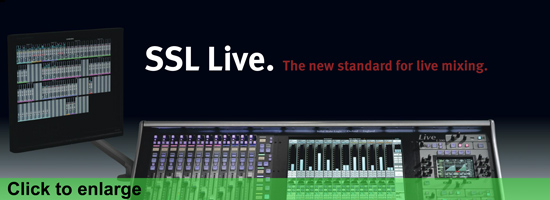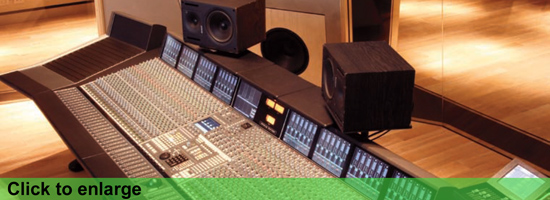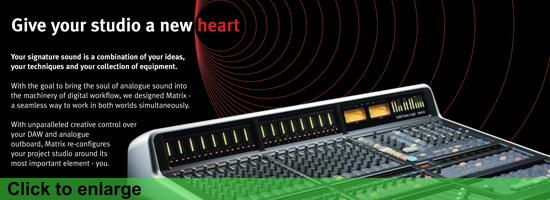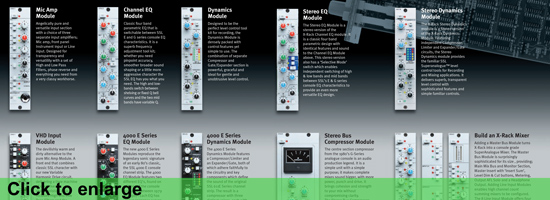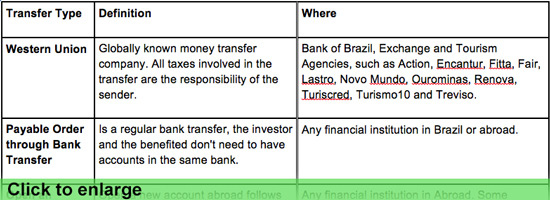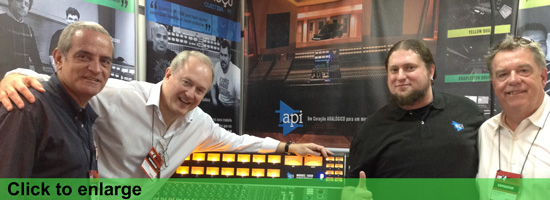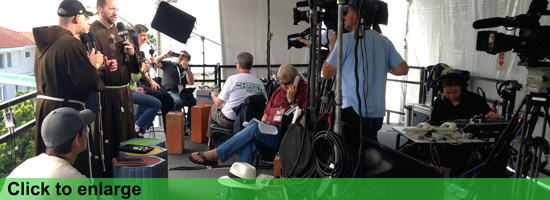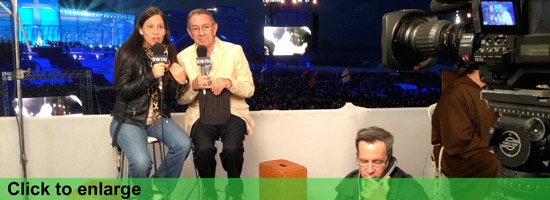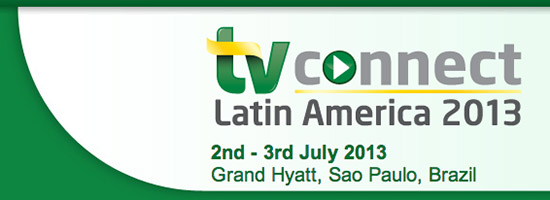
Interview: Max Noach from SSL
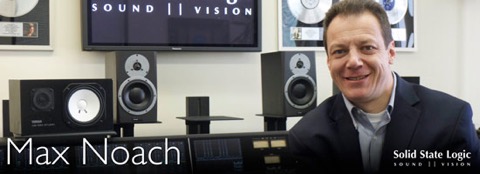
We had the pleasure of meeting Max already a couple of times during fairs in Brazil at the SSL booth, he was so kind to do an interview with us about his work at SSL and his point of view on the Brazilian market.
BB: Tell us who you are Max
Max Noach: “I am a Dutch citizen, born in Belgium and educated in French. I spent 10 years living in the UK when I first joined SSL in 1992, and have been living in Brazil for 10 years now.”
BB: What is your occupation
Max: “I am the Area Sales Manager LatAm for Solid State Logic”.
BB: How long do you work for SSL
Max: “I worked from 1992 to 2002 in various sales roles, and rejoined the company in February 2013”.
BB:How long do you work in the South America region
Max: “Since December 1992 - coming close to 21 years now”.
BB: How long does SSL exist, and how long in Brazil
Max: “SSL was founded in 1969 in Stonesfield, Oxfordshire, England, UK. The first SL 4000 G console was installed in Rio de Janeiro in 1989 (that commissioning engineer, Niall Feldman, still works for SSL and is now Director of New Products) and we pro-actively started working in Brazil in 1993”.
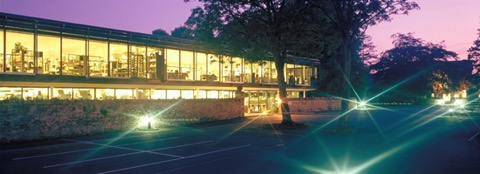
BB: Which product is most popular in Brazil
Max: “Difficult question to answer. Over the years, we have produced a wide range of products for a variety of applications. If we were to consider sheer unit numbers, I guess that Matrix and X-Rack win the trophy. If we were to look at turnover, Duality is the winner. These numbers might be superseded in the near future with the introduction of Live, our newest console for live sound applications”.
BB: Did you see a growth in audio/video related material in Brazil
Max: “Sure! With the advent and expansion of cable TV, digital terrestrial TV and web-streaming, we have witnessed sustained and continuos growth in this sector of the industry”.
BB: Which section in the audio/video market is strongest for SSL in Brazil
Max: “Our company and solutions traditionally attend to the upper tier of the market, i.e. large shows, complex sport events, mobile units requiring high capacity and quality audio”.
BB: We saw you at the AES and Broadcast&Cable, which other fairs in South America people and businesses can find SSL
Max: “We have attended local trade-fairs in Chile over the past 2-3 years. We are looking at exhibiting at ExpoMusic in 2014, Caper in Argentina, and a show in Colombia. We regularly organize workshops and roadshows with our local partners”.
BB: How is business and sales different from Europe & USA in Brazil
Max: “To state the obvious, custom duties and taxes, as well as the exchange-rate instability make it difficult for anyone to plan anything here. Also, the political and economical situation is very different in Brazil from more traditional markets such as the USA or the EU. This influences not just SSL's business, but nearly all sectors of the economy, making forecasts and planning almost "black science".
BB: Is the english language still a problem in communication
Max: “Yes and no. Yes if one considers the average fluency in English of the people we deal with on a day to day basis. No, because companies in South America require that their top managers possess a decent command of English. At SSL, we beg to be different: I'm fluent in both English and Portuguese, and my Spanish is up to a decent standard (I won't mention Dutch or French, only relevant in a couple of countries in South America)”.
BB: Are you partnering with other foreign companies here in Brazil
Max: “No. Our partners in Brazil are all established in Brazil”.
BB: How do you see the broadcast market in 2014 due to world cup
Max: “We see opportunities of course. Not just in the Broadcast market, but also in the Live sound market thanks to the many parallel events that will happen during the World Cup”.
BB: Which company is your biggest opponent in Brazil
Max: “I wouldn't say “opponent”. We have competitors, of course, as any company would. They tend to vary according to the projects and the markets - I couldn't per se qualify one as the “biggest” either”.
BB: Any surprising challenges in Brazil
Max: “As you may well know and have experienced yourself, Brazil is a territory with many challenges. After our 20+ years experience in the country, anything hardly surprises us anymore. And when it does, it tends to be in a positive way”.
BB: Are there new upcoming products you can tell us about
Max: “We just revealed two new broadcast products at IBC: the first Madi-Dante Bridge designed for Broadcast applications and the LMS-16, a revolutionary high-capacity loudness monitor that works together with our products or that can integrate as a stand-alone unit in broadcast installations.
SSL has a life-long history not revealing upcoming products before they are ready to be demonstrated and ready to ship. But we are having good news for you all.
There is close to a week left before the AES in New York and SSL will have 5 new products, yes, 5! Each of them worth the travel.
For Musical Production, we will have the Matrix2 and Sigma
For Live Sound, the Live, seen first time at the fairs in America
For Broadcast, our new Madi-Dante bridge, and the LMS 16, Loudness multichannel monitor.
Besides this, we will have the Duality ProStation, the C1- HD with V4, an AWS 948, Nucleus and of course our range of Converters and effects/processors at our stand.”
To register for the fair you can click here. To mark a SSL demo, click here
Be sure to check the Broadcast Brazil Facebook page and LIKE us.
Lot's of news, photo's and info for broadcasters, webcasters and mobile producers in Brazil.
mentioned:
SSL
AES
Expo Music
Caper
Broadcast & Cable
IBC
Remittance of International Payments
Remittance of International Payments
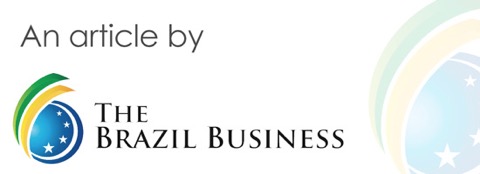
Brazil is a new investment target, but the country still presents many problems for investors that want to participate in the Brazilian market. This article outlines these problems and also proposes solutions to make business in Brazil a clearer and more successful process.
Brazil is a developing country in ascension with many attractive features for investors. With a vast territory full of natural resources and opportunities for expansion. In addition to the growing Brazilian economy and the increasing purchasing power of the population, the country has caught investors attention worldwide. Making Brazil a very appealing area for foreign financial transactions.
Business Environment in Brazil
A recent report developed by the World Bank ranked the economies of 185 countries according to the ease of doing business. From 1 to 185, the countries are classified in accordance by their regulatory environment for starting a new business.
If the environment is favourable to open a business or a new business operation the ranking is lower, closer to 1, and if the regulatory conditions are unfavourable the ranking is higher, closer to 185. Brazil was ranked 130th, a poor result in comparison to other South American countries, such as Argentina (124th), Paraguay (103rd), Uruguay (89th), Peru (43rd) and Chile (37th).

Problems to be Confronted
The low position of Brazil in the study can be explained by the number of necessary days it takes to open a business in the country. In Peru it takes 60 days and in Chile 32, while in Brazil the whole process can be completed in a staggering 156 days.
The Bureaucracy Barrier
It is clear that bureaucracy has decreased the ease of doing business in Brazil. Even though the country has become an important target for foreign investments some Brazilian problems cannot be ignored.
The country is a victim of a system of administration with many divisions, rules, controls and redundant procedures that, most of the time, are unnecessary for the opening of a business.
The bureaucracy in Brazil can be so overwhelming that even Brazilians get confused. This type of system nurtures the idea that every procedure in Brazil takes much longer than it should actually take and also diminishes the government's efficiency.
Delays and Clearer Contracts
Not only is their unnecessary time spent on opening a business in the country, there is also a problem for investors in Brazil. Payment can also be an issue, especially regarding delays. Brazilians are recognized worldwide for their ability to be late and unfortunately this ability can be also perceived in payments and in financial remittances.
Not all Brazilians have this problem, but in order to be cautious, the establishment of a good contract with explicit and verified information is the best option to guarantee the success of any type of business in Brazil.

Avoiding Complications with Bank Transfers
To avoid any type of trouble when doing business in Brazil it's important to understand how Brazilian banks work. Just like in any part of the world, banks in Brazil work with digital systems and systems don't always recognize mistakes.
For a financial transaction in a bank to be processed correctly, it is necessary to present the exact information that the bank requests. To be sure that the information requested by a bank is the same provided by the person that is sending the money, double-check the information is the most advisable option.
Razão Social and Nome Fantasia aren't the Same Thing
The lack of information or errors is a normal complication encountered by legal entities, on reason is due to the fact that in Brazil companies have two different names: Razão Social and Nome Fantasia. This part could be tricky for foreigners, since Nome Fantasia and Razão Social aren't universal terms. Both are nuances of Brazil therefore being unknown terms abroad. However, the knowledge of their meanings is fundamental to guarantee the success of a foreign payment.
• Razão Social: It's the nome comercial, denominação social or firma empresarial, which means the name with the company as it's registered in Brazil.
• Nome Fantasia: The name which the company is commonly known as, which can also be called the nome fachada or marca empresarial.
Example: McDonald's is a fast food restaurant popularly known by its Nome Fantasia, McDonald's. The Razão Social of McDonald's is registered as Arcos Dourados Comércio de Alimentos Ltda.
Usual Mistake
To money transfers by a company must indicate the Razão Social in the bank system. The biggest mistake made by foreigners is that they usually send their money with the Nome Fantasia of the company, which hinders the data matching of the bank system. If the information submitted by the foreigner doesn't correspond to the data registered in the bank the transaction will not occur, and the money will be returned to the sender or remains with the bank.
The info graphic below here shows ways to Send money to Brazil or to Abroad
We hope this information helps to give you a better understanding about the financial world and doing business in Brazil, and if you would like to read more articles related to this, let us know!
A big thank you goes to our friends at The Brazil Business who were so kind to write this for us.
Be sure to check the Broadcast Brazil Facebook page and LIKE us.
Lot's of news, photo's and info for broadcasters, webcasters and mobile producers in Brazil.
API 1608 Console Sold at Expo Music
API 1608 Console Sold at Expo Music
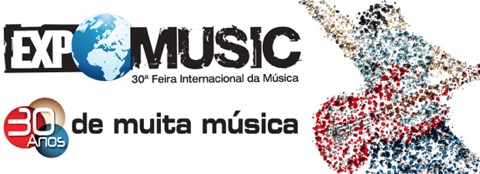
When visiting last Expo Music in São Paulo we met with the guys from API Audio and Visom Digital, and heard some great news from them.
Api is pleased to announce the order of a 32 channel 1608 console with P-mix automation to the newly built ALV Studios in Campinas, Brazil. The new studio, designed by the legendary George Augspurger is set to open with the console later this year. Api's Brazil distributor handled the sale from the show floor of the Rockin’ Expo Music show in São Paulo on day 2 of the show.
Carlos De Andrade, Visom Digital president said "with the acquisition of this fabulous API, AVL is poised to be the most exciting new studio opening in some years. Augspurger and API, with Brazilian artists.....what a great standard!”
Pictured at the API booth at Expo Music in São Paulo are from left, Paulo Campos and Carlos de Andrade of Visom Digital, Luis Venturin, owner of ALV Studios, and Dan Zimbelman, API Director of Sales.
Event video:
More photo's from the Expo Music fair, are available on our Broadcast Brazil Facebook page, you can find them here.
Like us if you want ;)
mentioned:
ALV Studio
API Audio
Expo Music
Visom Digital
UFC in Rio de Janeiro
UFC in Rio de Janeiro
The 2nd and 3rd of august BroadcastBrazil was in Rio de Janeiro, Brazil, at the UFC event.
We talked with Fernando Figueira, one of the Camera Operators of this UFC show, and had the chance to ask him some questions.
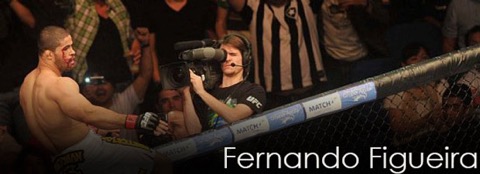
BB: So Fernando, please tell us what is your function, and what does it include
Fernando: “I am one of the Hand Held Camera Operators for the UFC events in Brazil”.
BB: How many shows are you on UFC in Brazil
Fernando: “I have worked at all the UFC Shows in Brazil, except the one that took place in Fortaleza”.
BB: What is the best part of the UFC events
Fernando: “The best part of the UFC shows is to be able to work with good professionals from all over the world”.
BB: What is the difference of Brazil and other countries at UFC events
Fernando: “At the UFC everything is detailed and structured. We receive a minute by minute script on each show, what makes our life much easier”.
BB: How is communication with foreigners in general in your work
Fernando: “ I am used working with a lot of foreigners, so I don't have any issues on communicating with them and I also made really good friends at those events”.
BB: What are the good and bad parts of Brazil as event host
Fernando: “UFC is getting bigger and bigger each day in Brazil, so hosting an event in different cities of the country will help it get even more popular.
The most difficult part of hosting international events in Brazil is to gather a good English Speaking Crew. We do have a lot of good professionals in the TV area but not all of them speak and/or understand English”.
BB: Do you notice a difference in foreign culture and your culture, in the way of working especially
Fernando: “On TV, all the engineering is the same. Sometimes we have to change the way things are done to accomodate a specific request from a different way of doing TV. But, as I mentioned, technically the process is the same all over the world. What really matters is the final result and a happy and satisfied client, no matter where they come from”.
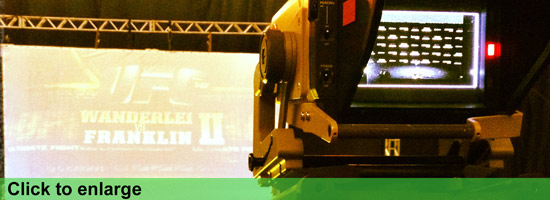
BB: Any specific technical difficulties this last UFC, and if so, these were due to what exactly
Fernando: “No specific problems at any of the UFC events”.
BB: Any good advice for the Brazilians in this area
Fernando: “It is very important to learn a second language, preferably English, due to the upcoming events in Brazil”.
BB: Do you see a rise in the amount of (english speaking) Brazilian Broadcast Technicians and Cameraman needed during the UFC in Brazil, and in which specific areas
Fernando: “ Till today it is still very hard to gather an english speaking crew here in Brazil.
BB: How do you see the future for Brazilian broadcast Technicians the coming years with all upcoming foreign events
Fernando: “Brazil has a really good future since we will have big events as the World Cup and Olympics. We are getting more investments in the area and that makes this kind of work stay even after these events”.
BB: What is the most important for you to be able to work with foreign companies
Fernando: “We are always learning, so be able to work with people from all over the world only brings more knowledge”.
BB: What kind of gear do you use
Fernando: “On UFC shows we work with an OB Van with 16 Grassvalley HD Cameras and 5.1 dolby áudio”.
BB: Any other international events you did this year? If so which ones and what was your function there.
Fernando: “I did the World Youth Day in Rio de janeiro where I worked as Producer, also I did Pororoca Live for CCTV China as an Transmission Coordinator”.
World Youth Day:
Pororoca Live Event, behind the scenes:
So we hope this is, besides, fun to read, also a good help and insight information about foreign broadcast events held in Brazil and what the future may hold.
More photo's available on our Broadcast Brazil Facebook page, you can find them here.
Like us if you want ;)
And see our former blogposts about the UFC event held in Belo Horizonte, Jaraguá do Sul and Fortaleza
mentioned:
UFC
GrassValley
Pororoca
World Youth Day
CCTV China
Interview: Marcio Zukin, CTO SimTV
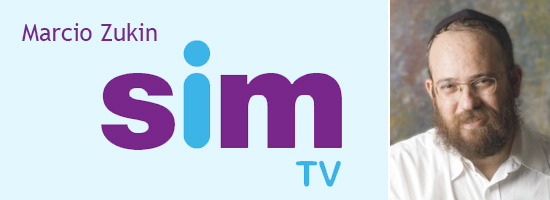
IPTV News Editor Jamie Beach interviews Marcio Zukin, CTO of Brazilian over-the-top video service Sim TV, on plans to move into transactional and ad-supported offerings, the television services that Brazilians value most, and the opportunity created by pay-TV piracy.
Marcio will be speaking at the TV Connect Latin America 2013 event taking place in São Paulo on 2nd-3rd July. For more information and to register, please visit latam.tvconnectevent.com
Jamie: Can you tell us a little about SimTV’s connected TV initiatives to date?
Marcio: Our connected TV initiatives include subscription VOD and live TV. SimTV was designed for delivery on every kind of device and also through an IP Box.
Eventually the platform will be developed in order to feature transactional and ad-supported services.
The focus of the project was to provide a very robust solution, using adaptive bit-rate technology, CDN networks and global data centres in the cloud, in order to deliver the best interface and a user-friendly workflow to the customer.
Jamie: What do you think Brazilians value most in a television service, beyond linear programming?
Marcio: There is a need to differentiate between content and service. In terms of content, Brazilians in general value football games and sports, movies, kids programming and comedies or sitcoms.
Regarding services, Brazilians value innovation, programmes with social comment and interaction, and which are up-to-date and available on a 24-hour basis.
Jamie: How big a problem is pay-TV piracy in Brazil?
Marcio: Pay-TV piracy in Brazil is not a problem, it is an opportunity, and a big one.
Let me explain. In my opinion, people turn to piracy for a number of reasons, almost as an ‘after the fact’ event.
If people would have a service, with reasonable quality, at an affordable and fair price, with dependability and good customer care, there would be no need to resort to illegal practices regarding pay-TV.
Many initiatives have already demonstrated this vision.
Jamie: What growth opportunities can you see in the pay-TV market?
Marcio: The pay-TV market has huge growth opportunities, in volume and quantity. Various industry surveys project that there will be 4.4mn active clients for IPTV services by 2017 in the Latam countries alone.
A huge variety of content and types of service is emerging: for example, an Italian that lives in Rio could watch live an Italian game in Recife at his tablet, early in the morning while still in bed.
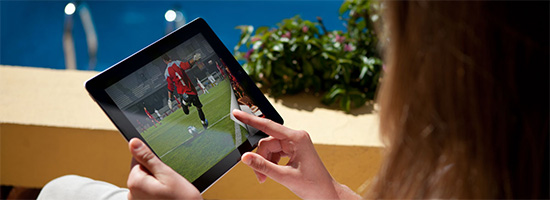
Then a few hours later he could be watching a recent specific Italian movie back in his apartment simultaneously (in a social network) with his friends that live in Italy.
While watching the movie, he uses the tablet as a second screen not only as a remote control but also to buy something that appears in the movie in an e-commerce site, or get more information on historical events related to a character of the movie, post a note on Facebook, and so on.
Event video:
Be sure to check the Broadcast Brazil Facebook page and LIKE us.
Lot's of news, photo's and info for broadcasters, webcasters and mobile producers in Brazil.
Mentioned:
Sim TV
TV Connect Latam
UFC in Fortaleza
UFC in Fortaleza
The 6th till 8th of june BroadcastBrazil was in Fortaleza in the state of Ceará, Brazil, at the UFC event.
We talked with Marcio Moreira, the Image Director of this UFC show, and had the chance to ask him some questions.
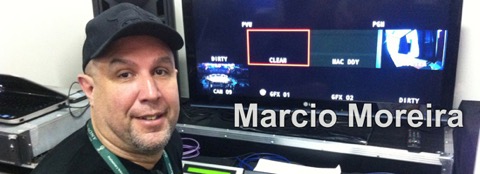
BB: So Marcio, please tell us what is your function, and what does it include
Marcio: “I am an image director and to get here I learned photography, Studio and external camera, graphics, video control cameras and also followed the work of other directors in the most varied areas of tv production”.
BB: How many years are you on UFC
Marcio: “I don’t know exactly the years, but till now I have done 5 UFC shows here in Brazil”.
BB: What is the best part of the UFC events
Marcio: “There is not e specific ‘best part’ at the event. The production for sure is great and very well organized. It is an event full of highly trained professionals”.
BB: What is the difference of Brazil and other countries at UFC events
Marcio: “Working also with music shows, live tv programs, and sports in General, the difference is the way of working with the Americans.
Everything is well rehearsed and scripted”.
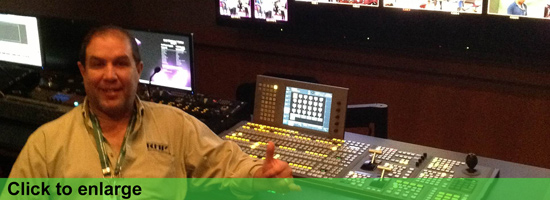
BB: How is communication with foreigners in general in your work
Marcio: “My communication is very good due to speaking English. We talked about the whole operation of the switcher and the camera movements before and during the events so there were no doubts left”.
BB: What are the good and bad parts of Brazil as event host
Marcio: “Brazil is a very big country. Has a geography very differentiated from other places and has a very large number of spaces for this type of event. The problem is that the best work and venues are located in urban areas and with many local rules, such as for example the city of São Paulo that has a time limit for a big event to end. In Brazil we have a lot of good professionals, but most of them do not speak a second language”.
BB: Do you notice a difference in foreign culture and your culture, in the way of working especially
Marcio: “The main difference is the way the event is produced. All those involved are very professional and organized”.
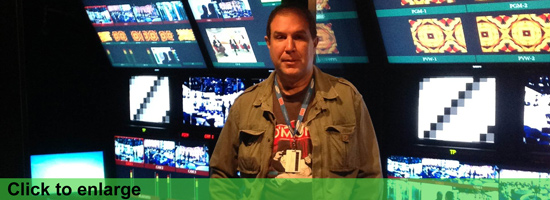
BB: Any specific technical difficulties this last UFC, and if so, these were due to what exactly
Marcio: “In the operating area I had no problem”.
BB: Any good advice for the Brazilians in this area
Marcio: “One advice that I can give to professionals in this area is to learn foreign languages, because we are having more and more international events”.
BB: Do you see a rise in the amount of (english speaking) Brazilian Broadcast Technicians needed during the UFC in Brazil, and in which specific areas
Marcio: “I realize that the need for professionals is very high in all operational areas, but having professionals for these areas that speak english is still very difficult”.
BB: How do you see the future for Brazilian broadcast Technicians the coming years with all upcoming foreign events
Marcio: “I see a good future for the Brazilian technicians. I believe many invest heavily in operational expertise, given the demand”.
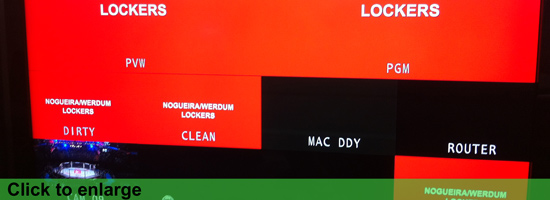
BB: What is the most important for you to be able to work with foreign companies
Marcio: “To have a lot of knowledge in the making. Always do your best. Cooperate and work as a team”.
BB: What kind of gear do you use
Marcio: “My equipment is the Switcher that has several video signals and graphs that are used during the event”.
BB: Tell is some more about this equipment/brand/type
Marcio: “The equipment tends to be Sony or GrassValley with 8 video outputs at least, 2 key-ers and 2MEs”.
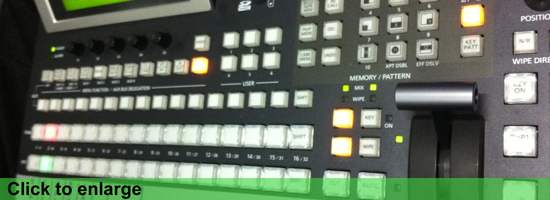
BB: You work both in Sao Paulo and in Rio, do you see already a difference in the Broadcast field in these 2 cities, if so in which way?
Marcio: “The professionals of the two cities meet the needs of all types of events. The difference is that in Sao Paulo, the number of events is greater”.
BB: What kind of events do you prefer to work on, sports, live music etc..
Marcio: “I like to work in all sports and mega musical shows, nationally and internationally”.
And of course, do you have other interesting notes to share from last UFC event:
“It is very good to be in the UFC and to be working with high-level professionals. It ss an event to work and learn”.
So we hope this is, besides, fun to read, also a good help and insight information about foreign broadcast events held in Brazil and what the future may hold.
More photo's available on our Broadcast Brazil Facebook page, you can find them here.
Like us if you want ;)
And see our former blogposts about the UFC event held in Rio de Janeiro, Belo Horizonte and Jaraguá do Sul
mentioned:
UFC
NEP
NYDigital
Panasonic (Switcher)
UFC in Jaragua Do Sul
The 16th till 18th of may BroadcastBrazil was in Jaraguá do Sul in the state of Santa Catarina, Brazil, at the UFC event.
This big fighting event was held in Arena Jaraguá.
We met with Peter Addams, the Audio Mixer of this UFC show, fortunately we had the chance to ask him some questions and check out his workplace after the show.
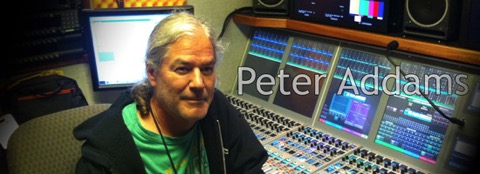
BB: So Peter, please tell us what is your function, and what does it include
Peter: “I am a Broadcast Show Mixer, Senior Audio. Lead of the audio department and I mix the television show. Also I plan the set up and co-ordinate all equipment with the Technical Manager”.
BB: How many years are you on UFC
Peter: “My first UFC event was in February 2003 so that makes a total of 10 years already”.
BB: What is the best part of the UFC events
Peter: “That's easy - our Audio crew. We have a core group of A2's that are very talented, hard working and don't whine (too much). They complement one another and work well together. Though each is a specialist they will go into each other's areas as needed”.
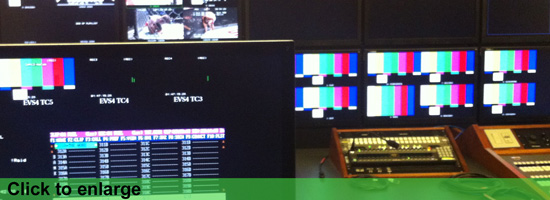
BB: What is the difference of Brazil and other countries at UFC events
Peter: “From my perspective? In the USA we are familiar with the mobile units we use. Though the mobile unit in Brazil was a joint venture between American based NEP and Brazilian based Casablanca, it was different than most of the mobile units we would use in the USA. This manifested itself in capacity and accessibility. We had fewer powered intercom channels than we usually do, couldn't access as many ports in the intercom system, the desk was only 48 faders instead of the usual 64 or even up to 144 on the surface as in USA. This is typical when we go overseas. In Europe we often use UK mobile units, other countries might involve a "fly pack." The challenge is to provide all the technical elements of our show regardless of the facilities we are using”.
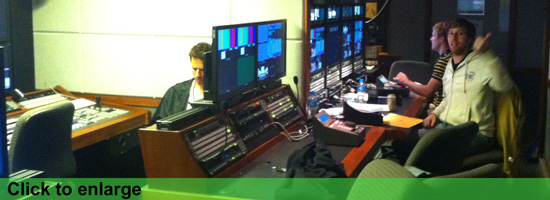
BB: How is communication in Brazil Challenging
Peter: “As I don't speak Portuguese. In the work environment I was really only dealing with English speakers so it wasn't a problem”.
BB: What are the good and bad parts of Brazil
Peter: “As event host nothing that effected me aside from the catering”.
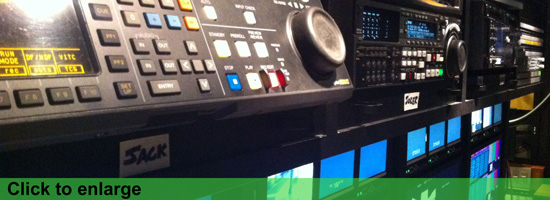
BB: Does the latin culture influence the way of working
Peter: “In my line of work this does not influence me”.
BB: Any specific technical difficulties this last UFC, and if so, these were due to what exactly
Peter: “It was the first time we used the mobile unit, that's always a challenge. Fortunately NEP sent Nick Romano and others who had done our show before on other mobile units”.
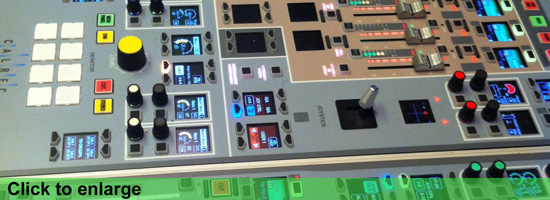
BB: Any good advice for the Brazilians in this area
Peter: “Obviously if you're working with USA television personnel, who tend not to master any other language aside from their own, English fluency is an asset. Also, understanding the urgency and immediacy that characterizes American television is important”.
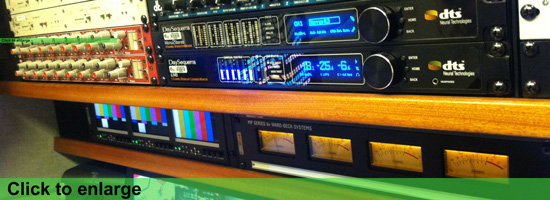
BB: And of course, do you have other interesting notes to share from last UFC event
Peter: “Due to big distances in Brazil, having the hour long bus ride to and from work makes a long day even longer.
The Hotel bar could've been open later and been more interesting. And why no Gin & Tonic? :)”
So we hope this is, besides, fun to read, also a good help and insight information about foreign broadcast events held in Brazil and what the future may hold".
More photo's available on our Broadcast Brazil Facebook page, you can find them here.
Like us if you want ;)
And see our former blogposts about the UFC event held in Rio de Janeiro and Belo Horizonte.
mentioned:
UFC
NEP
Casablanca
Impressions from NAB, Las Vegas
Impressions from NAB 2013
Las Vegas
Daniel Littwin for Broadcast Brazil
Every April, broadcasters, equipment manufacturers, service providers and anyone else associated with broadcasting meet in Las Vegas for the NAB Convention. As usual, I am here to see what’s new, make new acquaintances and contacts and plan the year ahead. This year I am sharing my impressions with Broadcast Brazil. The show as usual is extremely large, taking up the entire Las Vegas Convention Center. The convention is full of the sound of conversations, new business and old colleagues meeting each other. If you want to see anything it is very important to plan in advance, it is not possible to see everything in the time allotted.
I met with several manufacturers on Monday and had a look at what they had to offer:
EVS is showing their XT-3 LSM platform for sports offering integrated video recording, editing, playout, logging and archiving. Their XEDIO dispatcher for News handles content ingest, distribution, editing and storage. The applications for entertainment production and post production is an integration of several of their products allowing simultaneous ingest, editing, director preview, playout to air, archiving and integration with other post production software platforms.
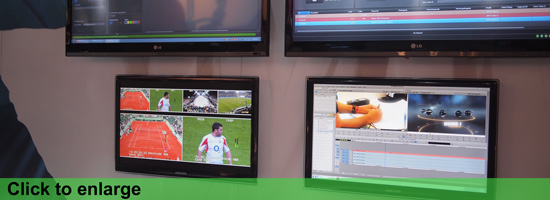
SSL is showing the enhancements made to the C10 Console and their line of production and post-production audio products.
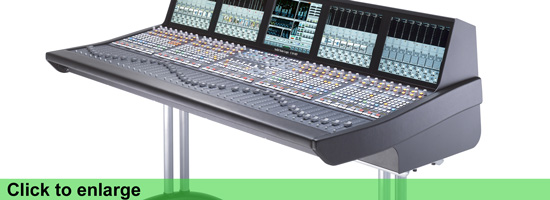
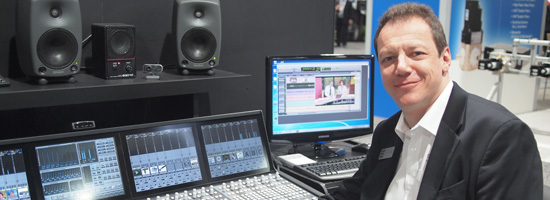
SHURE is showing their new line of microphones designed for use with SLR video cameras.
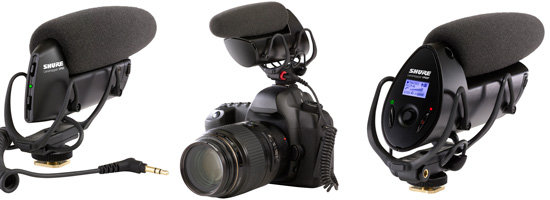
DOME Productions of Canada is showing their new HD truck with the chassis built by Girling. This truck showed just how efficiently space can be used in the design and integration of a large scale HD television truck, all the resources of a studio in a mobile package. A beautiful layout both technologically and aesthetically.
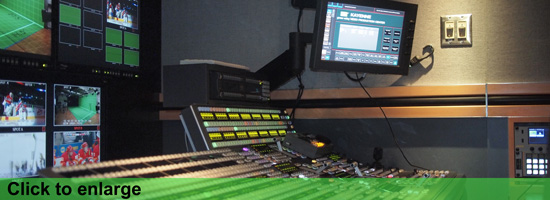
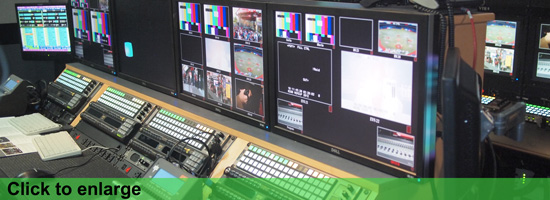
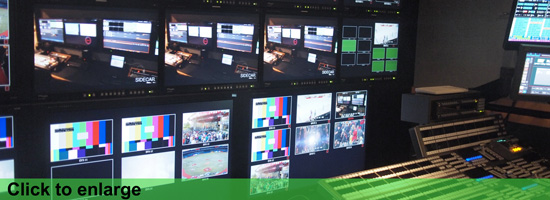
There are literally hundreds of manufacturers with new products and services. If you could only learn by just walking around and absorbing ideas through the air, you would be the smartest person in television.
Event video playlist:
Be sure to check the Broadcast Brazil Facebook page and LIKE us.
Lot's of news, photo's and info for broadcasters, webcasters and mobile producers in Brazil.
Mentioned:
SSL
EVS
SHURE
DOME productions
NAB
Genelec - Interview with Miguel Dominguez
Genelec
Interview with Miguel Dominguez
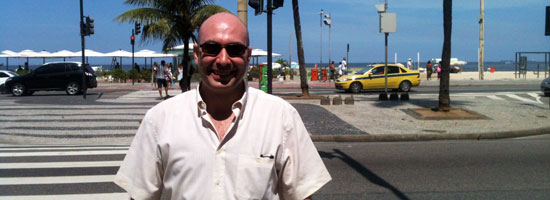
We had the pleasure to meet Miguel during his latest business trip in Brazil. Having a good lunch in Copacabana with a lovely beach view, it was the perfect place to get to know him and Genelec a bit better. Since Genelec is entering the Brazilian market we though it interesting to have Miguel tell us more about his points of view of the Broadcast Market.
BB: Miguel, what is your occupation
Miguel: ”I work for Genelec as Area sales manager”
BB: How long do you work for Genelec
Miguel: “Since August 2012”
BB: How long do you work in the south america region
Miguel: “About 10 years”
BB: How long does Genelec exist, and how long in Brazil
Miguel: “Genelec was founded in 1978. This year is the 35th Anniversary. Pride Music, the current distributor, has been working with Genelec the last 7 or 8 years, but you can find Genelec monitors in Brazil since the 80s and 90s.”
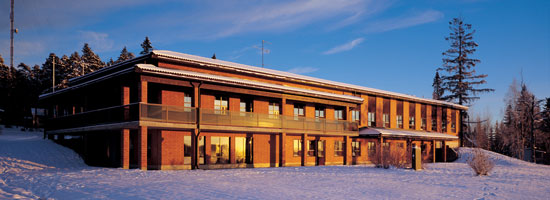
BB: Which product is most popular in Brazil
Miguel: “The top seller in 2012 was the 8030A, as it is all around the world.”
BB: Did you see a growth in audio/video related material in brazil
Miguel: “This is what the AV industry is probably expecting; Brazil is heading the technical improvements in the Broadcast market in the Latin America region. However, I think the main growth will happen within the next two years probably.”
BB: Which section in the audio/video market is strongest for Genelec in brazil
Miguel: “The top clients in number of units purchased are broadcasters, as usually happen everywhere for Genelec. I would expect to find an increased market and also more diversified in the short-medium term.”
BB: Official representatives are situated where, and how many
Miguel: “Genelec tries to work with only one exclusive distributor, although this depends very much on each country and the potential markets. We have right now in Brazil only one distributor, Pride Music, based in Sao Paulo, but they work with dealers in all the main cities of Brazil.”
BB: How is business and sales different from Europe/USA in brazil
Miguel: “The main difference is probably the difficulties in customs to import any product in Brazil. This changes the rules quite significantly.”
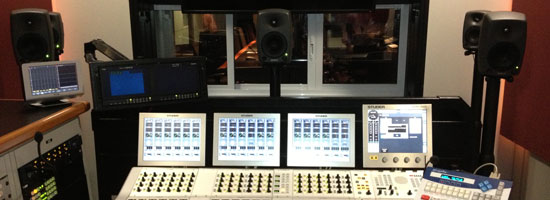
BB: Is the english language still a problem in communication
Miguel: “I don't really know since I communicate in Portuguese with my brazilian clients, or at least in ¨Portuñol¨, since I am Spanish native. I would think that in the professional level most of the engineers are able to speak in English and they don't have that lack of communication. Genelec hired me thinking in to open new direct channels of communications with the Portuguese and Spanish speaking markets in Latin America.”
BB: Are you partnering with other foreign companies here in brazil
Miguel: “Not right now although we have very good relationships with many manufacturers. We are discussing some possibilities with Dolby, and we are always in touch with manufacturers of mixers, microphones and other colleagues in the pro audio industry.”

BB: How do you see the broadcast market in 2014 due to world cup
Miguel: “The purchases of equipments that the Broadcasters can need for the world cup should be done within the next 12 months, probably less. However, the brazilian broadcasters are quite well equipped technologically. Another different issue is if they will have enough resources to cover properly all the events, but, if they don't have them and they don't want to buy them, the market will be interesting for foreign rental companies. Anyway it is a great opportunity for improving the technical development, already high, of the brazilian broadcast market.”
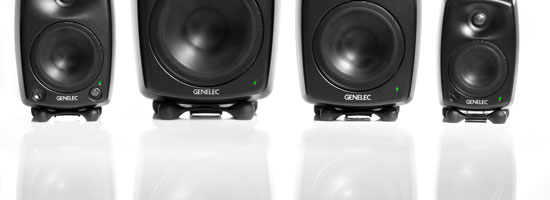
Miguel: “Due to the complicated system of taxes the manufacturers of less expensive monitors are usually hardest competitors. However Genelec is in a range of quality, reliability and performance where our typical competitors in Europe or USA are not real opponents in Brazil.”
BB: Any surprising challenges in brazil
Miguel: “Surprises depends on the open mind you have. In this industry usually any challenge can be faced up working hard and thinking smart. Perhaps the main challenge can be to change the trend of the brazilians of buying abroad, although it is not a surprise.”
BB: Are there new upcoming products you can tell us about
Miguel: “There are, but it is still too soon to talk about it. We will have many exciting new products along this year. Genelec has always tried to lead the industry of active monitors and I really think we are right now offering the state of the art technologies and it will be even better in the close future.”
So we hope this is, besides an interesting piece to read, also a good help inside a companies view and interests in the Brazilian market and future possibilities.
Be sure to check the Broadcast Brazil Facebook page and LIKE us.
Lot's of news, photo's and info for broadcasters, webcasters and mobile producers in Brazil.
mentioned:
Genelec
Dolby
Pride Music
English and "Consequences"
English and "Consequences"
Since we are an English focused website about the Broadcast, Webcast and Mobile world here in Brazil we really felt the need and of course pleasure to show you the following commercial from English school CCAA. They are known for using famous American actors for their marketing, but this is the first time we came across a great commercial from them.
Ok, besides that it is a great and funny commercial, the boy saying proudly Hotsydoggy (it's hotdog) it shows exactly the main issue in Brazil, and also one of the reasons we created Broadcast Brazil. There is such a big shortage in 'real' English speaking personnel in the Broadcast world in Brazil that these "consequences" as in the video do happen, of course not being attacked by sharks ;-), but in a practical real way.
For example:
A Video Director needing to give directions to a cameraman while the camera operator speaks only "more or less" English (claiming he speaks it) Consequence? Wrong shots, misplaced timing.... And so on. Of course we know that technical talk is different in each country, even using the English language, and that is why it is even more important to learn and really dominate your English. Besides that all us English speaking people in this Broadcast world are needed the coming years more and more!
The Shark Attack!
You can see the Shark attack as a metaphor for the foreigners attacking your jobs and if things don't change many people from other countries will be doing the work at coming World Soccer and the Olympics, it sounds a bit harsh, but it is a becoming reality. This commercial shows us the importance of being able to communicate worldwide and don't have to worry for "The Consequences" Here also the making of video, which is worth your time!
We'd love to hear your opinion about this commercial.
Broadcast Brazil
mentioned:
CCAA
Patrick Hendriks & Dakar 2013
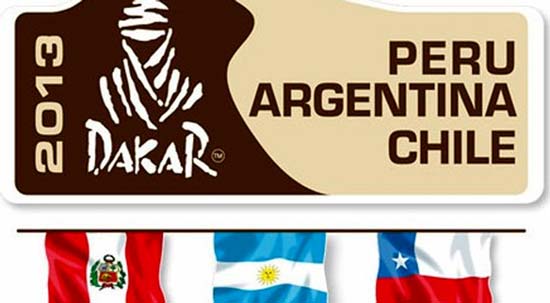
Dutchman Patrick Hendriks is working at the famous Dakar 2013 rally, which takes place in 3 South American countries. The Dakar Rally 2013 starts in Lima in Peru, than Argentina and the rally will continue to finish in Chili. Patrick will try to do some updates of his job on this blog at the time of the Dakar 2013 Rally.
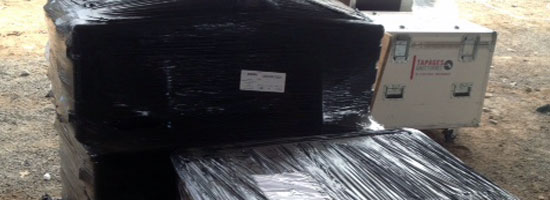
Patrick Hendriks: "All equipment arrived well in Peru, South America for the 2013 version of the Dakar rally".
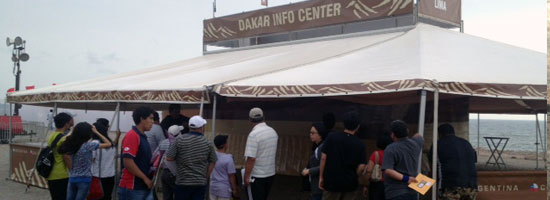
"We start this year in Lima. There we have to do our first setup and test all gear. Sometimes things can go wrong by the long transport from europe to South America. Of course we bring backup equipment but we need to test our main setup throughout" Patrick explains.
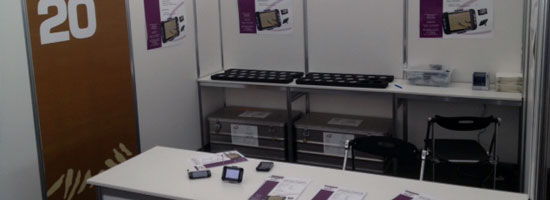
Patrick: "Also in Lima it was the possibility for the teams to rent a personal monitor. Therefor we had a place at the administration office were all competitors must past and take care of
all the paperwork for renting our monitors"
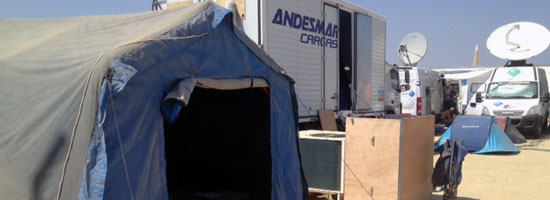
This years luxury BP Satellite Solutions BV tent :)
Patrick: "This year we work with a slightly different setup than at the 2012 version. In stead of the Black Magic Design mixer we took the Grass Valley Indigo mixer due to audio options that we need what the Black Magic Design mixers not have at this moment. For now I will tell about the Mixer case.":
"
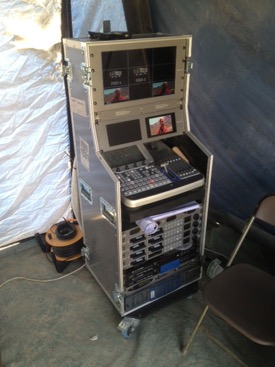
1 duo monitor Black Magic Design
Grass Valley Indigo mixer
Wohler audio display LM53-4
Wohler audio monitor MP1A
4 SSD recorders/ players Black Magic Design
2 Tascam DVD player DV-D01
1 Zandar multiviewer DX 16
1 rack glue Leitch
1 rack fiber Flashlink
video:
About Patrick Hendriks:
Patrick Hendriks performs his profession by his company BP Satellite Solutions B.V.
BP Satellite Solutions B.V. is specialized in sales, rental installation and de-installation of satellite transmitter and receiver systems. Besides this, BP Satellite Solutions B.V. has its own technical maintenance service, supplies SNG services and is the address for ecologically sound disposal of all your broadcast equipment. The first time Patrick Hendriks came into contact with transmitting was in 1978 through a twelve channel AM transmitter. From that moment his love affair with transmitting began. In 1980 he switched to FM 27 Mhz followed by a local radio station “Keizerstad” in Nijmegen . The appearance of the first ASTRA satellite on the scene was Patrick's first encounter with satellite television. That, in combination with his love for transmitting led to a newfound interest. This was also the time that he started installing “dishes” for family and friends. Patrick now has more than 25 years experience in the field and he has been globally active for the last 11 years. A little over fifteen years ago, Patrick switched to professional broadcasting. As an SNG operator he started with Sonotech in Hilversum after which he was an employee of United Broadcasting Facilities when they acquired Sonotech. After his stint at United it was time for a new challenge. Patrick became a freelancer and went to work for New Skies as a Payload Operations Controller. This brought him into contact with the other side of the professional spectrum. However, after two years the bug bit him once again and he returned to professional broadcasting.
The years followed Patrick was working as Technical Director for the German frim WIGE MEDIA AG. In that role he was responsible worldwide for the Formula 1 broadcasts of RTL Germany, RTL Netherlands, Sky Italia and ZDF Germany. As BP Satellite Solutions B.V. Patrick now takes care of all facilities for the F1 broadcasts for MTV3 Finland, Setanta Ireland, ViaSat Sweden / Denmark / Norway and RTL Netherlands. Also he still is hired by WIGE MEDIA AG for the final report of the Formula 1.
mentioned:
Dakar
BP Satellite Solutions B.V
Black Magic Design
Grass Valley
Wohler
Tascam
Zandar (Harris corporation)
Leitch (Harris corporation)
Flashlink
